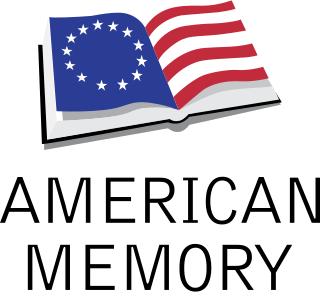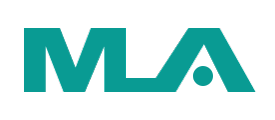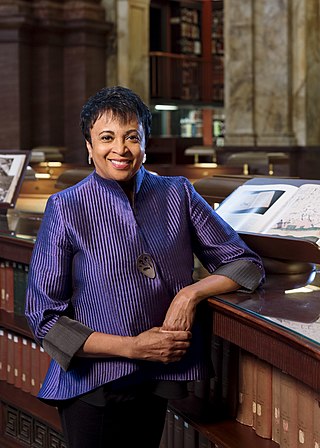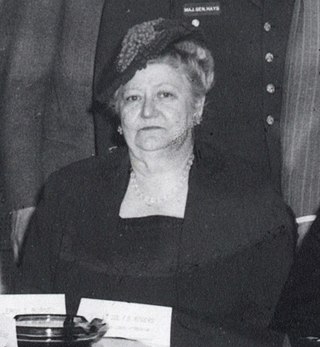
A librarian is a person who works professionally in a library providing access to information, and sometimes social or technical programming, or instruction on information literacy to users.

American Memory is an internet-based archive for public domain image resources, as well as audio, video, and archived Web content. Published by the Library of Congress, the archive launched on October 13, 1994, after $13 million was raised in private donations.

The Medical Library Association (MLA) is a nonprofit educational organization with more than 3,400 health sciences information professional members.

A health or medical library is designed to assist physicians, health professionals, students, patients, consumers, medical researchers, and information specialists in finding health and scientific information to improve, update, assess, or evaluate health care. Medical libraries are typically found in hospitals, medical schools, private industry, and in medical or health associations. A typical health or medical library has access to MEDLINE, a range of electronic resources, print and digital journal collections, and print reference books. The influence of open access (OA) and free searching via Google and PubMed has a major impact on the way medical libraries operate.

Elonnie J. Josey was an African-American activist and librarian. Josey was the first chair of the Black Caucus of the American Library Association, having been instrumental in its formation in 1970; served as president of the American Library Association from 1984 to 1985; and was the author of over 400 books and other publications.

The American Association of Law Libraries "is a nonprofit educational organization with over 5,000 members nationwide. AALL's mission is to promote and enhance the value of law libraries to the legal and public communities, to foster the profession of law librarianship, and to provide leadership in the field of legal information and information policy."
Education for librarianship, including for paraprofessional library workers, varies around the world, and has changed over time. In recent decades, many institutions offering librarianship education have changed their names to reflect the shift from print media to electronic media, and to information contained outside of traditional libraries. Some call themselves schools of library and information science, or have dropped the word "library" altogether.

Journal of Librarianship and Information Science is a quarterly peer-reviewed academic journal that publishes papers in the fields of Information Science and Library Science. The journal's Editor is Anne Goulding. It has been in publication since 1969 and is currently published by SAGE Publications.
A paperless society is a society in which paper communication is replaced by electronic communication and storage. The concept originated by Frederick Wilfrid Lancaster in 1978. Furthermore, libraries would no longer be needed to handle printed documents. "Librarians will, in time, become information specialists in a deinstitutionalized setting". Lancaster also stated that both computers and libraries will not always give us the information that other people and living life will.
Evidence-based library and information practice (EBLIP) or evidence-based librarianship (EBL) is the use of evidence-based practices (EBP) in the field of library and information science (LIS). This means that all practical decisions made within LIS should 1) be based on research studies and 2) that these research studies are selected and interpreted according to some specific norms characteristic for EBP. Typically such norms disregard theoretical studies and qualitative studies and consider quantitative studies according to a narrow set of criteria of what counts as evidence. If such a narrow set of methodological criteria are not applied, it is better instead to speak of research based library and information practice.
Librarianship and human rights in the U.S. are linked by the philosophy and practice of library and information professionals supporting the rights enumerated in the Universal Declaration of Human Rights (UDHR), particularly the established rights to information, knowledge and free expression.

The University of Chicago Graduate Library School (GLS) was established in 1928 to develop a program for the graduate education of librarians with a focus on research. Housed for a time in the Joseph Regenstein Library, the GLS closed in 1989 when the University decided to promote information studies instead of professional education.. GLS faculty were among the most prominent researchers in librarianship in the twentieth century. Alumni of the school have made a great impact on the profession including Hugh Atkinson, Susan Grey Akers, Bernard Berelson, Michèle Cloonan, El Sayed Mahmoud El Sheniti, Eliza Atkins Gleason, Frances E. Henne, Virginia Lacy Jones, William Katz Judith Krug, Lowell Martin, Miriam Matthews, Kathleen de la Peña McCook, Elizabeth Homer Morton, Benjamin E. Powell, W. Boyd Rayward, Charlemae Hill Rollins, Katherine Schipper, Ralph R. Shaw, Spencer Shaw, Peggy Sullivan, Maurice Tauber and Tsuen-hsuin Tsien.
John Duncan Cowley FLA was Director of the School of Librarianship of the University of London from 1934 to 1944 and was the Goldsmiths' Librarian in 1944. He joined the RAFVR in 1940 and was a Squadron Leader at the time of his death.
Naomi C. Broering was a medical librarian, elected fellow of the American College of Medical Informatics, past president of the Medical Library Association, and past Dean of Libraries at the Pacific College of Health and Science.

Estelle Brodman (1914–2007) was an American medical librarian and medical historian. She held positions at Columbia University, the National Library of Medicine and the Washington University School of Medicine (WUSM). Brodman served terms as director of the Special Libraries Association, president of the Medical Library Association, and editor of the Bulletin of the Medical Library Association. Under Brodman's leadership, the library at WUSM became known as a leader in the use of computing machines to perform library functions.

Mary Louise Marshall was Librarian and Professor of Medical Bibliography at Tulane University School of Medicine, and the longest-running president of the Medical Library Association (1941–46).

James M. Matarazzo was an American academic and librarian who taught at Simmons University for almost 50 years. He was a national and global leader in the field of special libraries.
Gwendolyn Stiggins Cruzat is Professor Emerita of the University of Michigan School of Information and Library Studies. Her teaching and scholarship made significant contributions to medical librarianship. Cruzat was named one of the 100 most notable medical librarians by the Medical Library Association in 1998.
The Japan Medical Library Association (JMLA) is a professional organization for medical libraries in Japan. The primary goal of the association is to provide training for medical librarians and to facilitate interlibrary loans.










